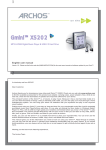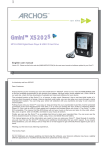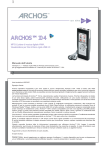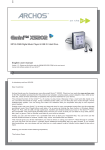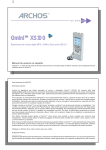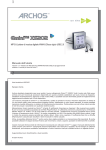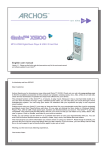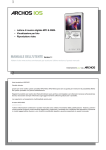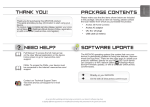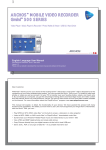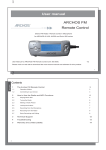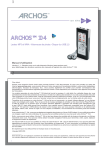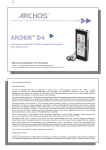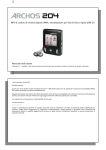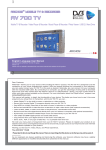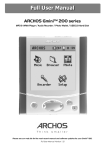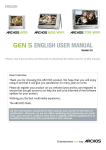Download ARCHOS™ 104
Transcript
1 ARCHOS™ 104 MP3 & WMA Digital Music Player / Photo Viewer / USB 2.0 Hard Disk English user manual Version 1.1 - Please see the Archos web site (www.archos.com) for the most recent manual and software updates for your Archos™ 104. 1 2 An introductory note from ARCHOS Dear Customer, Archos thanks you for choosing our new ultra-small Archos™ 104. Check out our web site www.archos.com to find the available accessories for this product (car adapter, carrying cases, etc.). Also, while at our web site, check for free downloads of updated and improved software for your device. The principal function of the Archos™ 104 is, of course, to play music. Because it has a real hard disk inside of it, you can store hundreds of songs. Using a standard audio cable, you can also play your music through a home entertainment system. You can bring your entire CD collection with you anywhere and play it over anyone’s sound system. Putting music onto your Archos™ 104 is as easy as ‘drag and drop’ for your unprotected music files. And for protected purchased music from PlaysForSure web sites, it is as easy as clicking the Sync button in Windows Media® Player. Plus, with its USB 2 high speed port, transfers are finished before you know it. The Archos™ 104 is also ID3 compatible. This means that the ARCLibrary will sort your music so that you can listen to it by artist, album, title, year, or genre. Click on Shuffle, and listen to your music at random. With your Archos™ 104 you can also view photos on the built-in OLED screen. Just transfer them from your computer, and you’ll be able to look at them wherever you take your Archos™ 104. Finally, you can always use the Archos™ 104 as a portable hard drive to carry your important files with you. You can even use the Archos double-browser to rename, create, copy, move, and delete files and folders. This manual gives you all the information you need to know on using your Archos™ 104. Read through it carefully, you just may find out it can do some neat things that you didn’t expect. If you are stuck, you can always call our help line or e-mail support to get a friendly Archos agent to give you a hand. Wishing you the best music listening experience, The Archos Team __________ As our engineers are always updating and improving the software, your device’s software may have a slightly different appearance or modified functionality than presented in this manual. 2 3 Table of Contents 1 2 3 4 5 6 Ports, Buttons, and Connections First Time Usage 2.1 Charging the Battery 2.2 Turning the Archos™ 104 ON and OFF 2.3 Changing the Interface language 2.4 Caring for the Archos™ 104 2.5 Foreign Character Sets Playing Music 3.1 Playing a Music File 3.2 Play Screen and Button Control 3.3 Playback Menu Items 3.4 ARCLibrary Specifics 3.5 ARCLibrary Updating 3.6 Setting a Bookmark 3.7 The Resume Function 3.8 Locking the Archos™ 104 Buttons Putting Music onto your Archos™ 104 4.1 Synchronizing Music from Windows Media® Player (WMP) to the Archos™ 104 4.2 Comparison of Windows Media Player 10 to Windows Media Player 9 4.3 Transferring your CD collection to the Archos™ 104 4.4 Installing Windows Media® Player (WMP) 9 4.5 Installing Windows Media® Player (WMP) 10 Playlists 5.1 Creating a new Playlist 5.2 Loading a Playlist 5.3 Playing a Playlist 5.4 Playlist Menu Options Settings 6.1 Changing the Sound Settings 6.2 Changing the PlayMode Settings 6.3 Changing the time & date settings 5 6 6 7 7 7 7 8 8 9 11 11 12 12 12 13 14 14 15 15 16 16 17 17 18 18 18 20 20 22 23 3 4 7 6.4 6.5 6.6 Using 7.1 7.2 7.3 Changing the Display Settings Changing the Power Settings Changing the System Settings the Browser Inside the MUSIC Folder Navigating the Directory Structure File and Folder Operations in Browser Mode 7.3.1 7.3.2 7.3.3 8 Contextual Menu on a File Contextual Menu on a Folder Contextual Menu while in the Double Browser 24 25 26 27 27 28 29 29 29 30 7.4 Using the Virtual Keyboard Viewing Photos with your Archos™ 104 8.1 Using the Photo Browser 8.2 Photo Browser Contextual Menu 8.3 Transferring Photos to your Archos™ 104 8.3.1 8.3.2 Transferring Photos in Hard Disk Mode Transferring Photos in Windows Device Mode 30 32 32 33 34 34 34 9 Connecting the Archos™ 104 to a Stereo system 10 Connecting the Archos™ 104 to/from your Computer 10.1 USB Connection Type (‘Hard Drive’ or ‘Windows Device’) 10.2 Connecting the Archos™ 104 10.3 Disconnecting the Archos™ 104 from your Computer 11 Using iTunes™ with your Archos™ 104 12 Updating the Archos™ 104 Firmware 12.1 Download the Update_Archos104.AOS file 12.2 Copy to Archos™ 104 root and Update 12.3 ‘Hard Drive’ or ‘Windows Device’? 12.4 Activate the Update 13 Troubleshooting 13.1 USB Connection issues 13.2 File issues, corrupted data, formatting, and partitioning. 13.2.1 Windows® ME Running Scan-Disk (Error Checking) - Hard Disk Mode only 13.2.2 Windows® XP & 2000 Running Check Disk Utility (ChkDsk) - Hard Disk Mode only 14 Technical Specifications 15 Technical Support 16 Legal and Safety Notices 4 35 36 36 36 37 40 41 41 41 42 42 43 43 45 46 46 47 48 51 5 1 Ports, Buttons, and Connections A Power jack – to connect an optional AC adapter/charger B USB 2.0 port – To connect to your computer to transfer files to Archos™ 104 and to charge its battery C Headphone Jack D On button (hold 3 seconds) & Menu options E Off button (hold 3 seconds) & Stop/Escape* Navigation pad F Move Up & increase volume G Move Down & decrease volume H Move Left (decrease value) or audio rewind I Move Right (increase value) or audio fast forward J Play/Pause/Enter 1 CHG – Battery charging indicator 2 HDD – Hard drive activity indicator 3 ON – ON/OFF indicator light * Hardware reset: in the event that your Archos™ 104 freezes operation (due to electrostatic phenomena for example), you can reset the Archos™ 104 by holding down on the STOP/ESC button x for 15 seconds. 5 6 2 2.1 First Time Usage Charging the Battery Before using your Archos™ 104 for the first time, completely charge the battery for two hours. • The Archos™ 104 is charged through its USB connector. Connect the included USB cable to a running computer and plug the other end into the Archos™ 104 while it is off. This will charge its internal battery. The CHG indicator will also light up to show that its battery is charging. • The battery is fully charged when the CHG indicator starts blinking. CHG indicator is on: CHG indicator is blinking: The battery is currently being charged. The battery is fully charged. • You can purchase an Archos charger/adapter to charge the battery from a wall outlet. The blue CHG indicator lights up to indicate that the external adapter is connected. The battery will charge automatically when it is plugged in. • After the first initial full charge, you may use the Archos™ 104 while the AC adapter is plugged in. 6 7 2.2 Turning the Archos™ 104 ON and OFF • Press and hold the ON/Menu button until the screen comes on. • The Archos™ 104 will automatically shut off after a given amount of time if no buttons are pressed. To conserve battery energy, the backlight will automatically shut off. You can change these parameters in Setup > Power. • Press and hold the Stop/off button until the Archos™ 104 shuts off. 2.3 Changing the Interface language • English is selected as the default language for your Archos™ 104 user interface. You can choose another language by going to Setup > Display (press the MENU button, then the ENTER button to access the Setup menu). 2.4 Caring for the Archos™ 104 The Archos™ 104 is an electronic product that needs to be treated with care. • Do not subject it to unnecessary shock or vibration. • Do not subject it to heat. Keep it ventilated (especially when connected to a computer). • Keep the Archos™ 104 away from water and excessively humid areas. • Keep the Archos™ 104 away from high electromagnetic fields. 2.5 Foreign Character Sets You have the possibility to display your file names, folder names, and MP3 ID3 tags in various character sets (ex: Korean, Japanese, Simplified Chinese, etc.). You can find the language files CodePage_name.4fz in the font folder under /Data on the Archos™ 104 hard disk or on the Archos website under the heading Software. If, for example, you would like to have the Japanese language display, you would copy the file Cp932.4fz into the folder /system on the Archos™ 104 . Shut down and restart the Archos™ 104 . File names, folder names, and ID3 tags written using the Microsoft® codepage for the language will now be displayed in that character set. Only one.4fz file can be used at a time, thus you should only put one.4fz file into the /system folder. When an.4fz language file is used, the interface language will be set to English. 7 8 3 Playing Music Once the Archos™ 104 has been turned on, the following screen is displayed. You can select the major functions from this main menu. • Music: Browse through the folder Music or use the ARCLibrary music selection system. • Photo: Browse through and view all the pictures on your Archos™ 104. • Browser: Browse through and manage all of the other files on your Archos™ 104. • Resume: Resume playing from the last place you stopped. You can also access the Setup menu by pressing the MENU button and then the ENTER button to set the parameters of your Archos™ 104 to your personal taste. 3.1 Playing a Music File By clicking on the Music icon in the main menu screen, you will enter into a ‘music only’ mode. File types other than WMA, WAV, and MP3 that may be in those folders will be filtered from view. There are two ways to access your music, by selecting Browse hard disk or by searching the songs’ tag information, Artist, Album, title, etc. In the case of Browse hard drive, you will be sent directly to the Music folder of your Archos™ 104. Here you can look at all your music files and the folders on your Archos™ 104’s hard drive as if you were browsing files with a computer. The other way is to browse your music by tag information, artist, album, song name, year, or genre. The Unknown category indicates that the file has no tag data. To select a music file, use the navigation controls UP and DOWN to move upwards or downwards and ENTER to enter a highlighted subfolder or tag category. Click ENTER to play the highlighted song. Use LEFT to leave a folder and go back to the previous level. 8 9 3.2 Play Screen and Button Control (1) Menu available (2) Artist* or parent folder (3) Album* or current folder (4) Song title* or file name (5) Status: playing (6) Play Mode: Folder (7) Play Order: Repeat (8) Volume (0-99) (9) Battery level (10) Real time clock (11) Song elapsed time (12) Song remaining time (13) Album cover (if it is available) *If the file contains these tag data 9 10 B A Play/pause/resume song B Increase the volume C Click once: Play the next song in the folder or playlist. Hold: Fast forward through the song. D Decrease the Volume E Click once: Play the previous song in the folder or playlist (during first 10 seconds of song) otherwise go to the beginning of the song. E Hold: Fast reverse through the song. F F Stop Song Play Status Stopped A C D Play Order (no icon) Play once Playing a track Shuffle (Random) track selection Current track is paused Repeat playing The top status bar indicates the status and play settings that you have given. See the Settings chapter for a description of the Playmode options. 10 11 3.3 Playback Menu Items When the menu icon appears, you have certain options. During song playback, press the MENU button for the following options. • Setup: Enters the Setup screen (same as selecting the Setup icon in the main menu) which allows you access to parameters such as bass and treble. C • Info: Show file information such as the file name, number of kilobytes of hard drive space used, date created, file format, etc. • ARCLibrary: Allows you to browse through your ARCLibrary while listening to the current song. • Edit Playlist: Enters the playlist editor (see below how to use Playlists). • Set Bookmark: Set a bookmark at the current position within the audio file. See the Bookmark section below. 3.4 ARCLibrary Specifics The ARCLibrary is a system for choosing your music by its characteristics. It can be turned On or Off in the settings from Setup > Playmode. As shown in this screen capture here, you can select your music by Artist, Album, Song Title, Genre, or Year. MP3 and WMA music files have internal data tags to hold information about the song. For MP3 files, these are known as ID3 tags. Not all MP3 files have all this information filled in. If you purchase a song from a music download service, the song will have this information. If you have an MP3 or WMA file without this tag information, then you can add or change it by going to the properties of the file in Windows® Explorer. Once you update the ARCLibrary, you will have access to all newly copied music via the ARCLibrary. The ARCLibrary indexes all the music and playlists that it finds in the folders Music and Playlists by using the tag information in each song. Thus, you should never delete the folders Music or Playlists. If a song does not have tags, it will be put into the category <unknown>. 11 12 3.5 ARCLibrary Updating If you paste unprotected audio files from your computer to the Archos™ 104, they go directly to the Archos™ 104 hard disk without the ARCLibrary knowing about the new song. This is why the ARCLibrary is updated when you disconnect your Archos™ 104 from the computer. Alternatively, you can set up the ARCLibrary to update only when you choose to, by setting it to “On”, not “automatic”. You can find the information on how to do this in the section Playmode in the Settings chapter. You will then have to go to the Setup > Playmode screen, highlight [Update ARCLibrary] and press ENTER. A message screen will appear indicating that it is updating the ARCLibrary contents. 3.6 Setting a Bookmark If you are listening to a song, or perhaps a long recording, and would like to place a bookmark in it in order to pick up from this point at another time, you can use the Bookmark function. While listening to the audio recording, simply click on the MENU button, then choose Set Bookmark. This will set a bookmark in the audio file at the current position. You can only set one bookmark per file. When you look at the file in your browser, it will have a small mark on its icon indicating that this file has a bookmark set within it. You can have a maximum of 16 files bookmarked. Setting more bookmarks will erase existing bookmarks, starting with the oldest. The next time you play the audio file, you will be presented with three options: Resume: Start playing from the bookmarked position. Ignore: Keep the bookmark but start playing from the very beginning. Clear: Clear the bookmark from this file and start playing from the very beginning. 3.7 The Resume Function When you turn on your Archos™ 104 you will sometimes notice that the icon which is highlighted on the main screen is not the Browser but rather the Resume icon. This icon is highlighted when the Archos™ 104 can resume the last played audio file. 12 13 3.8 Locking the Archos™ 104 Buttons You can prevent the Archos™ 104 from executing unintended functions by locking the buttons. To lock the buttons, hold down on the MENU button until the “lock” icon appears in the top-left corner of the screen. Now the buttons are disabled, but you can still use the UP and DOWN controls on the navigation pad to change the volume. To unlock the buttons hold down again on the Menu button until the “lock” icon disappears. 13 14 4 Putting Music onto your Archos™ 104 Your Archos™ product is a certified PlaysForSure™ digital device which means that wherever you find music for sale or for subscription on the Internet with this symbol, you can be certain that they will ‘Play for sure’ on your Archos™ 104 *. The Archos™ 104 is designed to work seamlessly with Windows Media® Player (WMP) versions 9 and 10. The Windows Media® Player software is used to download digital media content from the Internet to your computer and organize it. You will also use it to synchronize (copy) the contents of your Windows Media® Player media library to your Archos™ device. See the comparison chart below for an explanation of the different features available when running Windows Media® Player 9 and 10 or check out the Web site www.playsforsure.com. * Subscription services require you to be running Windows Media® Player 10. 4.1 Synchronizing Music from Windows Media® Player (WMP) to the Archos™ 104 The Synchronize button in Windows Media® Player (WMP) is a one way ‘sync’ button. That is, it will add music and photo files to your Archos™ 104 so that you have the same digital media on your Archos™ 104 as you have in your Windows Media® Player media library. Of course, you can choose to sync only certain songs or photos, or sync your entire library. On WMP10, you can click the button Set up Sync in the Sync tab and then check the box labeled Synchronize Device Automatically. This is the auto-sync advantage of WMP10. If this box is checked, then each time you connect your Archos™ 104 to your PC, Windows Media® Player will automatically start up and check to see if there is any new music or photos in your media library, and if so, will then copy them to your Archos™ 104. On the other hand, with Windows Media® Player 9, you have to tell it what you want to sync, WMP9 cannot synchronize automatically when you connect your Archos™ 104 to your computer. Note for WMP10 users: Files added to your Archos™ 104 from another computer cannot be added to the Windows Media® Player Library when you connect your Archos™ 104 to the computer. Songs which have been added, will however, be listed in the device’s ARCLibrary. 14 15 4.2 Comparison of Windows Media Player 10 to Windows Media Player 9 Windows® Media Player 10 is only available for Windows® XP (service Pack 1) and newer operating systems. It is worth your while to upgrade to Windows® XP (home or professional) and to Windows® Media Player 10. The list below shows the advantages. Functionality WMP9 WMP10 Auto-synchronize the WMP library to Archos™ 104 on connecting to PC no* yes Can synchronize subscription music (‘to go’ services) to your Archos™ 104 no yes Carefree USB disconnection (no special green arrow unmount procedure) PlaysForSure™ audio content no yes * Must use WMP9 manual sync function to copy purchased music to the Archos™ 104. 4.3 Transferring your CD collection to the Archos™ 104 The process of transferring music from a CD into files for your Archos™ 104 is known as ‘ripping’. It is actually a transcoding process, taking the CDA (CD Audio) format and converting it to WMA or MP3 format which the Archos™ 104 can read. There are many music ripping programs on the market, but the easiest thing to do is to use Windows Media® Player to do it. In fact, when you place a music CD in your computer, Windows® will ask you if you would like to rip it. Depending on the power of your computer, to rip a 60 minute CD, it will take anywhere from 10 minutes to 60 minutes. Once this is done, the album will become part of your music library. Connect your Archos™ 104 to your computer with the supplied USB cable. Now, you go to the Sync tab and tell Windows Media® Player to synchronize that album to your Archos™ 104. It will then transfer that album to your Archos™ 104. Note: Some music CDs have a special copy protection system that will not allow Windows Media® Player to make music files from them. 15 16 4.4 Installing Windows Media® Player (WMP) 9 If you have Windows® ME or 2000, you should use Windows Media® Player 9. The easiest way to install this software is to visit the Microsoft® Website and download the very latest version. 4.5 Installing Windows Media® Player (WMP) 10 You must be running Windows® XP (Service Pack 1 or higher) in order to install Windows Media® Player 10. Please visit Microsoft’s PlaysForSure website (www.playsforsure.com) and download the very latest version of Windows Media® Player 10. 16 17 5 Playlists A Playlist is a list of songs that the Archos™ 104 will automatically play one after the other. The Archos™ 104 can handle one Playlist at a time. You can create new Playlists, add or delete songs from a Playlist, or Save a Playlist as a file (file type.m3u) to be used another time. There is no limit to the number of Playlists you can save on the Archos™ 104 hard drive. A Playlist can have a maximum of 1000 songs in it. 5.1 Creating a new Playlist To create a Playlist, press the RIGHT button while you are in the Music browser. A second panel is opened on the right side to display the Playlist contents (shown empty in the picture). You can now start adding songs to the current Playlist. Note: If tracks are displayed in the right panel, this means a Playlist is already open. To create a new Playlist, close the current list first (see the Playlist Menu options) and click RIGHT again. In the left panel, search for the songs you would like to add to your Playlist. Once the song is highlighted, click on the ENTER button to add it to the Playlist. The song will be added to the Playlist and a small mark is placed next to the music note icon to indicate that it is now in the Playlist. You can also add all the music files of a complete folder in one operation by highlighting the desired folder and choosing ADD or INSERT on the menu. Be careful about which panel you are in since the left panel menu has different options than the right panel menu. Continue searching and adding songs in this manner until you are satisfied. You can jump back and forth anytime between the two panels by clicking LEFT/RIGHT on the navigation pad. We recommend that you save your Playlists to the Archos™ 104 hard drive (see Playlists Menu Options below) to use it again later. After saving a new Playlist, use the menu of the left panel to update the ARCLibrary in order for it to appear in your Playlists folder. The menu also offers you the option INSERT: The track will be added before the track which is highlighted in the Playlist. 17 18 5.2 Loading a Playlist You can load a previously saved Playlist or add the files it contains to the current Playlist. Use the music browser to select the Playlist of your choice (Playlists are indicated by a special list icon) and then press OK. If there were already some items in the Archos™ 104 Playlist, then the songs of the loaded Playlist will be added to the end of it. You can then check or modify the Playlist as usual in the Playlist panel. 5.3 Playing a Playlist After loading a Playlist, press the RIGHT control on the navigation pad to go into the Playlist edition panel. Then use the UP and DOWN controls to select a song. Click on ENTER, and your Playlist will start playing from that song according to the current PlayMode settings. 5.4 Playlist Menu Options While in the Playlist screen (right side) you have the following options. • Save: Saves the current Playlist onto the Archos™ 104 so that it can be reloaded later. It will be saved into the directory Playlists. • Close: Closing the list enables you to create a new Playlist by using the RIGHT control of the navigation pad whilst in the Music folder or any of its sub-folders. • Rename: Changes the name of the current Playlist using the Virtual Keyboard. • Shuffle: Randomly changes the order of the items in the loaded Playlist. • Clear: Removes ALL tracks from the loaded Playlist. 18 19 • Move: Allows you to change the order of songs in the Playlist by moving them up or down using the UP/DOWN buttons of the navigation pad. • Delete: Removes the highlighted track from the playlist. Note: To delete a Playlist, navigate to Browser > Playlists. Highlight the Playlist, the menu button, highlight Delete and press ENTER. (Moving a music track) Important: Once you save a Playlist it is important that you do not move the actual files as the Playlist searches in the original file location. If you need to move your files to a different folder, you’ll have to recreate your Playlists. 19 20 6 Settings There are a number of parameters you can set on the Archos™ 104 to make it operate according to your particular needs. To access the Setup menu, press the MENU button and then the ENTER button from the main screen. Within the menus, you will find different parameters. In order to modify a parameter, click LEFT or RIGHT on the navigation pad. Note that once you have reached the last option, clicking further will not normally take you back to the first item in the list. 6.1 Changing the Sound Settings If you would like to customize the sound quality, go to [Setup > Sound]. 20 21 Parameter Description Volume Range: 0 to 99 Controls the current volume. Balance Range: -10 to +10 (left to right) Sound effect Rock, Techno, Jazz, Classic, Live or Custom Change this parameter to select an equalizer setting to the style of music you are listening to. Select Custom to set your own equalizer levels. [Set Equalizer] To customize the equalizer. See below. [Reset] Sets all your sound parameters with default or flat values. Customizing the equalizer To set the equalizer, highlight the [Set equalizer] line and then click on ENTER. You will now be able to adjust the Archos™ 104’s five band equalizer. Use the LEFT/RIGHT buttons to select a specific frequency range (Bass, Medium-Base, Medium, Medium-Treble, Treble) and then use the UP/DOWN buttons to increase or decrease the response for the given frequency range. Modifying these settings changes the sound in real time. Thus it is best to change these values while listening to a song. 1. 2. 3. Change values 4. Exit screen. 21 22 6.2 Changing the PlayMode Settings If you would like the Archos™ 104 to play through an entire folder of songs, play songs at random (shuffle), or any of the other playing options, you can set these parameters in the Playmode settings. Go to Setup > Playmode. Parameter Description Current Folder Play all tracks in the current directory All Play all tracks on the Archos™ 104 Single Play a single track then stop Queue User can queue the next track to be played † Scan Archos™ 104 plays first 15 seconds of each track †† Repeat and shuffle This parameter allows you to choose the order of play of your songs (no icon) Normal: the music sequence is played once Repeat: the music sequence is played in a loop Shuffle: the music sequence is played randomly 22 23 ARCLibrary Off, On. Automatic (default) The ARCLibrary feature enables you to see your music organised by Artist, Album, Title, Genre and Year. Select Off to disable the feature or On to enable it. On Automatic, the library will update itself when disconnected from the computer. ARCLibrary Update Scans through all music and playlists in the folders Music and Playlists and indexes these into the ARCLibrary. You need to do this only when you have copied new music to your Archos™ 104. †Queue Mode: While the current song is playing, simply click on the menu button and select Browser or ARCLibrary (depending on the current folder), find the next song you want to play, then click ENTER. This is your queued song. The lower arrow of the Queue icon will turn black. You can only queue one song at a time. See the Playlist section to prepare multiple songs to play. Once the current track has finished playing, your queued track will be played. If you do not queue another track at this time, the Archos™ 104 will play the next song in the original directory. ††Scan Mode: Each track in the directory is played for 15 seconds. This allows a quick sample of each song. If you want to play the whole song, click on the Play button during those first 15 seconds. The Archos™ 104 will then revert to single directory mode and play the rest of the songs in the directory without scanning. 6.3 Changing the time & date settings In order to set the time and date or to change the time format, go to Setup > Clock. 23 24 The Time format can be set to a 12 hour clock (0:00 to 12:59) or 24 hour clock (0:00 to 23:59). The Time is expressed in Hours, Minutes and Seconds, although seconds are not displayed. The date is expressed as Day, Month and Year. Having modified all necessary parameters, be sure to set them. To do this, highlight the [Set] line and then click ENTER. Wait a moment for the Archos™ 104 to save the new values before clicking the STOP/ESCAPE button. 6.4 Changing the Display Settings In order to change the operating language, the brightness of the display or the appearance of the Archos™ 104, go to Setup > Display. Parameter Description Language Use this option to set the operating language of the Archos™ 104. Options are English, Français, Deutsch, Español and Рчсский. Brightness Adjusts the brightness of the screen. Be aware that a high level of brightness can affect battery life. Wallpaper Choose the background image that will appear on your Archos™ 104. Appearance Choose the color of your Archos™ 104’s icons. 24 25 6.5 Changing the Power Settings To help you get the most battery life out of your Archos™ 104 before having to recharge it, you can adjust the power settings. Go to Setup > Power. Parameter Description Power Off Range: 1 to 9 minutes or Never. Number of minutes of user inactivity before the Archos™ 104 automatically shuts off. The Archos™ 104 will not shut off during the playback of music files. Never (on DC Power) indicates that the Archos™ 104 will not do an automatic shut down. Backlight Backlight shut down time: Off, 10 to 90 seconds, Never. The time of user inactivity (no buttons pressed) before the Archos™ 104 turns off the backlight. Never indicates that the backlight will always stay on. Keeping the backlight on will reduce the battery time. Hard drive 10-90 seconds. The number of seconds from the time of the last file access before the Archos™ 104 tells the internal hard disk to stop spinning. The longer this time, the more often the hard disk is turning and the quicker the response time when accessing files. However, as it is set longer, it will quickly consume your battery. Caution: This setting should only be changed by experienced users. The default setting is 10s. 25 26 6.6 Changing the System Settings To change the system parameters or get information about the system, go to Setup > System. Parameter Description Show all files If “Off” is selected, files are filtered so that only music files are shown. The “On” setting lets you see other file types as well as music files. USB Port Windows Device, Hard disk. When set to Windows Device, your Archos™ 104 will use the MTP (Media Transport Protocol) whenever it is connected to a Windows XP (SP1 or higher) operating system with Windows Media® Player 10 installed. It will be seen as the Archos™ 104 ‘Device’ in Windows® Explorer. WARNING: This will not work for earlier Windows® operating systems or Macintosh® computers. When set to Hard Drive, your Archos™ 104 will act as an external hard drive (mass storage device) when connected to a computer. Use this mode for all non-Windows® XP operating systems. OS Version Displays the current version of the Operating System (OS). Prod key Display the product key of your Archos™ 104 . Every Archos™ 104 has a unique product key number. Hard Disk Displays the amount of free and used space on the Archos™ 104’s hard disk. Reported number of megabytes is binary based counting (1kb=1024 bytes). Thus each reported MB represents approximately 1.05 megabytes (decimal). Formatting also takes up space. [Update Firmware] Used to update the Archos™ 104 to a new version of the Operating System. See the chapter Updating the Archos™ 104 Firmware. 26 27 7 Using the Browser The browser is used to navigate the file system on the Archos™ 104. The file system is the same type of file system that is found on Windows® based computers. This way, transferring files from your computer to your Archos™ 104 is as easy as ‘drag and drop’. The file system is a hierarchical system which includes folders and subfolders. Because you will be putting hundreds of files onto your Archos™ 104, it is STRONGLY ADVISED that you keep a neat and orderly file structure. We suggest that you keep the predefined folders: Data (to carry miscellaneous data files with you), Music (all of your music files), and Playlists (to hold all your music Playlists). 7.1 Inside the MUSIC Folder The top level of your Archos™ 104 includes the folder Music. Most people who create neat file structures for their Archos players make the following hierarchy within the Music folder. Level 1 – Artist (Dire Straits, Madonna, Stravinsky, etc.) Level 2 – Album (Brothers in Arms, American life, etc.) Level 3 – Song (Money for Nothing, etc.) The folders Music and Pictures are special folders in that the Music and Photo icons on the main screen lead to these folders directly. They should not be deleted or renamed. 27 28 7.2 Navigating the Directory Structure Just below the top status bar, you can see the directory you are currently viewing. To navigate the directory structure you will use the UP/DOWN controls of the navigation pad to move through the files in a directory. Press ENTER to enter a highlighted folder. To go back up one level in the directory structure, you can either use the contextual MENU button (select Parent) or click on the LEFT control. The contextual MENU button allows you to create new folders, delete folders, rename a file or folder, or display information about a file. Button Controls Button Action Up Highlights the previous file or folder in the current directory Down Highlights the next file or folder in the current directory Right Open double-browser or gives the focus to the right panel. Left Goes to parent directory if single panel view. Gives the focus to the left panel when in double-browser mode. ENTER Folder highlighted: enters this folder. File highlighted: Plays the file if it is a music file, displays the picture if it is a JPG file. Off/Escape Exit Browser mode. Menu Displays the contextual menu. 28 29 7.3 File and Folder Operations in Browser Mode While browsing the directory structure, you will have the option to manipulate files and folders. When you use the Browser mode, you will be browsing through the Archos™ 104’s hard drive as if browsing via a computer. In Browser mode, you can create folders, delete files or folders, rename files or folders, and copy or move files from one place to another. 7.3.1 Contextual Menu on a File Info: Show file information such as song length, number of kilobytes used of hard drive space, date file was created, etc. Rename: Allows you to change the name of the highlighted file. You cannot change the file extension type for file types that are playable by the Archos™ 104. You will be sent to the virtual keyboard (see the next section) to enter the new file name. Delete: Delete the file permanently from the Archos™ 104. (Before it is deleted, the Archos™ 104 will ask for confirmation: “Delete file? - Yes/No”). Press ENTER to confirm or STOP/ESCAPE to cancel. Create Folder: Create a new folder in the current level of the directory. You will be sent to the Virtual Keyboard to enter the new folder name. There is a limit of 1000 files per folder. 7.3.2 Contextual Menu on a Folder Info: Show file information such as number of kilobytes of hard drive space used, date created, number of files and folders the folder contains etc. Rename: Allows you to change the name of the highlighted folder. You will be sent to the virtual keyboard (see the next section) to enter the new folder name. Delete: Delete the file permanently from the Archos™ 104. (Before it is deleted, the Archos™ 104 will ask for confirmation: “Delete folder X? - Yes/No.” Press ENTER to confirm or STOP/ESCAPE to cancel. Create Folder: Create a new folder in the current level of the directory. You will be sent to the Virtual Keyboard to enter the new folder name. There is a limit of 1000 files per folder. 29 30 7.3.3 Contextual Menu while in the Double Browser By using the unique Archos double browser system, you can copy or move files from one location in the file structure to another (caution: there is a limit of 1000 files per folder). While in the Browser mode, you simply click the RIGHT control and a second browser panel will open. You can jump between the two panels using the LEFT/RIGHT buttons. When the title of the folder is highlighted, this is the active folder. The file highlighted within this active folder will be copied, that is to say, it is the source for the copy. The other panel will be the destination folder. Once you have decided on the destination folder, move to the source browser panel, highlight the file to copy, and then click on the MENU button. You can now choose Copy to copy the highlighted file, Copy All to copy all the files in that folder to the destination folder, or Move to move it to the destination folder. Other options such as Info, Delete, Rename and Create Folder are addressed above. Source 7.4 Destination Using the Virtual Keyboard If you want to create folders and rename files or folders, it is recommended to do so from your computer when it is connected to the Archos™ 104. The computer keyboard is easier to use. At times, however, you are not near your computer and you would like to enter the text directly with the Archos™ 104. For this, you will use the Virtual Keyboard. You will be taken to this screen when you rename a file or folder or create a new folder. You will use the LEFT, RIGHT, UP, and DOWN controls to move around the keyboard. Click on ENTER to enter the character that is highlighted. Once your text is entered, select Enter on the bottom right. 30 31 1 Contextual Menu 2 Text being typed 3 Cursor 4 Upper/Lower case* 5 Delete character* 6 Clear entire line* 7 Enter* * These items can also be found in the contextual menu Tip: use the STOP/ESCAPE button to cancel any changes you made and exit the virtual keyboard. 31 32 8 Viewing Photos with your Archos™ 104 With your Archos™ 104, you can view pictures in the JPEG format* on the built-in LCD screen. They will be automatically resized by the Archos™ 104 to fit on its screen. By clicking on the Photo icon in the main menu screen, you will enter into the Photo browser. File types other than JPG that may be in the ‘Pictures’ folder and its subfolders will not be displayed. * please note that the progressive JPEG format is not supported. 8.1 Using the Photo Browser To select a picture for viewing, use the navigation controls UP and DOWN to move upwards or downwards and ENTER to view the highlighted picture or open the highlighted folder. When the picture is displayed on the screen, you can use the navigation controls LEFT (or UP) to view the previous picture and RIGHT (or DOWN) to view the next picture. Once you reach the first or last picture in the current folder, you will be sent back to the photo browser. 32 33 8.2 Photo Browser Contextual Menu Just like in the browser mode, you can rename files and folders and delete them if needed, and you can create folders to sort your picture files. You simply need to press the MENU button to display the contextual menu. See the instructions given in chapter 7 on using the browser. Info Another feature of the photo browser is the possibility to view picture information such as the size of the picture file, the date and time it was created, and the image’s resolution. If a photo contains EXIF information, it will also be displayed. You will then see information such as the brand and model of the digital camera that took the digital photograph, the exposure time and aperture, whether the flash was used or not, etc. Standard Info screen Info screen with EXIF data Save as Wallpaper You also have the possibility to save one of your own pictures as the wallpaper for your Archos™ 104. Simply select Save as wallpaper in the contextual menu while viewing a picture or when the picture file is highlighted. 33 34 8.3 Transferring Photos to your Archos™ 104 There are three different ways of transferring photos to your Archos™ 104 from your computer. The most suitable method for you will depend on your Archos™ 104’s USB port setting (see section 6.6 of this manual): Hard Disk or Windows Device. 8.3.1 Transferring Photos in Hard Disk Mode If your Archos™ 104 operates in Hard Disk mode, you can simply copy your pictures onto it: • • • • connect your Archos™ 104 to your computer (see chapter 10 of this manual). on your computer, locate the pictures you want to transfer, select them and copy them (right click > copy). open ‘My Computer’ and double click on the Archos™ 104 hard drive. open the Pictures folder of your Archos™ 104’s hard drive and paste your pictures there (right click > paste). Note that your photos must go in the Pictures folder if you want to be able to view them directly on your Archos™ 104. 8.3.2 Transferring Photos in Windows Device Mode If your Archos™ 104 operates in Windows Device mode, choose one of the following methods. Copy Photos to the Media/Pictures folder • connect your Archos™ 104 to your computer (see chapter 10 of this manual). If an ‘MTP Media Player‘ window pops up asking what you want to do, select ‘take no action’ and click on OK. • • • on your computer, locate the pictures you want to transfer, select them and copy them (right click > copy). open ‘My Computer’ and double click on the Archos™ 104 device. open the Media folder, and then the Pictures folder of your Archos™ 104 device and paste your pictures there (right click > paste). Note that your photos must go in the Pictures folder if you want to be able to view them directly on your Archos™ 104. Sync with Windows Media® Player 10 If you use the Windows Media® Player library to manage your photos, you can synchronize your Archos™ 104 device to your computer’s library. (see section 4.1 of this manual to learn how to use Windows Media® Player to synchronize your pictures and music automatically). 34 35 9 Connecting the Archos™ 104 to a Stereo system Connecting your Archos™ 104 to a stereo system allows you to listen to your Archos™ 104’s music on it without a headset. You will need a standard (mini headphone to RCA) audio cable for this which is not supplied with the Archos™ 104. The diagram below illustrates the setup. Plug the audio cable into the headphone jack and into the auxiliary jacks on your stereo. Note that this is only a schematic representation of a stereo. If in doubt, the manual of your stereo will enable you to identify the auxiliary inputs. 35 36 10 Connecting the Archos™ 104 to/from your Computer 10.1 USB Connection Type (‘Hard Drive’ or ‘Windows Device’) Your device comes configured as a Windows® Device and will be immediately recognized by your computer if you are running Windows® XP (with Service Pack 1 minimum) and Windows Media® Player 10. If you have another version of Windows®, not sure what version of Windows® XP you have, or if you are using a Macintosh®, then you will need to change the USB (Universal Serial Bus) Port setting on the Archos™ 104. You will do this by going to System and USB Port and change it to ‘Hard Disk’. 10.2 Connecting the Archos™ 104 Connection order: See the sections below for your particular computer’s operating system. 1) Turn on the Archos™ 104. 2) With your computer running, plug the USB cable into your computer. 3) Plug in the other end of the USB cable to the Archos™ 104 USB Device port (if your computer asks to install a new driver for the new hardware, then you must unplug it and change the USB Port to Hard Drive.) Windows® XP Please verify* that you have Windows® XP and it is updated it to at least, Service Pack 1. You must also have Windows Media® Player 10 (WMP10) installed on your computer. This way, you can take advantage of connecting it as a ‘Windows Device’. Connect it to your PC as enumerated above and you can then see the Archos™ 104 in Windows® Explorer and WMP10. Without Windows® XP Service Pack 1 (a free update) or Windows Media® 10, you cannot use it as a Windows® recognized ‘Device’ and will have to follow the instructions for Windows® ME & 2000 below. * Right-click on ‘My Computer’ select ‘Properties’, and then look in the tab labeled ‘General’. It should say “Service Pack 1” or higher. Windows™ ME and 2000 Attention: Before connecting the Archos™ 104 to your computer with the USB cable, go to Setup>System>USB Port and change it to ‘Hard Disk’. 36 37 When connected to your computer, the Archos™ 104 will be recognized as an external Hard Drive and display automatically within a few seconds of being connected. You will see a new drive letter, such as E: in My Computer. You can now use the hard drive called Archos™ 104 like any other external hard drive. Simply access it using Windows™ Explorer to drag and drop files to and from the Archos™ 104’s hard drive. If the Archos™ 104 is not automatically recognized and displayed as an external hard drive, please refer to the troubleshooting section at the back of this manual. Macintosh™ OS X If you have OS X, you must update to version 10.3.9 or newer. You must also change the Archos™ 104’s USB Port setting to ‘Hard Disk’. From the main menu, go to Setup>System>USB Port and change it to ‘Hard Disk’. You will now simply plug the Archos™ 104 into your Macintosh® as enumerated above, and within a few seconds, the Archos™ 104 will be recognized as a mass storage device (Hard Disk) and mount on the desktop. You can now use the hard drive called Archos™ 104 like any other external hard drive. 10.3 Disconnecting the Archos™ 104 from your Computer Windows Device Mode If the Archos™ 104 is connected to your computer as a Windows Device, verify that no data is being transferred between your Archos™ 104 and your computer (the HDD light on your Archos™ 104 is not flickering). You can now safely unplug the USB cable from your Archos™ 104 and/or computer. Hard Drive Mode If the Archos™ 104 is connected to your computer as a hard drive, DO NOT SIMPLY PULL OUT THE USB CABLE AT ANY TIME! WARNING: You must properly remove (unmount) your Archos™ 104 from the computer before disconnecting the USB cable to avoid loss of data or freezing the computer and/or the Archos™ 104. 37 38 Hard Drive Mode & Windows™ To safely disconnect the Archos™ 104 hard drive, click on the system tray remove icon (green arrow as shown below) and follow the instructions. Wait until you get a message saying that you can safely unplug the device before disconnecting the USB cable. Attention: The operating system will not allow you to safely disconnect the Archos™ 104 if you have an open file from it in a running application. You will have to close all open Archos™ 104 files in any running application. Sometimes, even when files are closed in an application, you will have to shut down the application. Using the green disconnect arrow in the system tray will then allow you to safely disconnect the Archos™ 104. 1. The safe remove icon is in the system tray near the system clock. Windows® XP Windows® 2000 & Windows® ME 2. Click on the icon to Eject (unmount) the Archos™ 104 from your computer and then select the ‘Safely remove’ message. 3. There will be a message indicating that it is now safe to disconnect the Archos™ 104. You can now go ahead and unplug the USB cable from the Archos™ 104. 38 39 Hard Drive Mode & Macintosh™ First, close all programs that are using files from your Archos™ 104. Drag the Archos™ 104 hard drive icon towards the trash can, and the trash can will become a big arrow as shown in the screen image. Drop the hard drive icon onto the arrow. The hard disk icon will disappear from the desktop. You can now safely unplug the USB cable from your Archos™ 104 and/or your computer. 39 40 11 1 1 Using iTunes™ with your Archos™ 104 The easiest way to transfer music files between a Macintosh® computer and your Archos™ 104 is to use the Macintosh Finder™ to drag and drop the files to and from your Macintosh®. However, for Macintosh® users who do want to use the Archos™ 104 with iTunes®, Archos has developed a special i-Tunes® plug-in. You will find it in the folder /Data/i-Tunes Plug-in on the Archos™ 104 hard disk or from the Archos website. In this folder you will find a .sit compressed file. Uncompress it and open the folder for your operating system. You will find a JPEG image illustrating where you need to copy the plug-in to. Once this is done, iTunes™ will recognize the Archos™ 104 as a ‘Device’. Currently there is no plug-in for the PC version of iTunes™. To make your user experience easy as possible, please keep in mind the following. 1) Music purchased at Apple’s on-line music store are copy protected with a proprietary encryption system. The ARCHOS device will not be able to play this purchased music or files in AAC format which you might have created. It will happily play MP3 format files without problem. 2) When you create your Playlists with iTunes® (you can only create Playlists from songs that have been copied to your Archos™ 104 ), your Macintosh® will save these Playlists to the root directory of your Archos™ 104. It will not save them to the Archos™ 104 Playlists directory. It would be best to use the Archos™ 104 itself to make Playlists and then save these Playlists in your Playlists folder. 3) When you drag and drop MP3 files from your iTunes® library to your Archos™ 104, the i-Tunes® program will look at the ID3 tag information of the MP3 file, and create a folder on the root of your Archos™ 104 using the name of the Artist as the folder name. Then it will take the Album name ID3 tag, and create a subfolder with that album as its name. Finally, it will take the MP3 song itself and place it into that album subfolder. Thus, although it is a clean structure of artists and albums, i-Tunes® does not follow the Archos™ 104 convention of placing the music into the Music folder first. 40 41 12 1 2 Updating the Archos™ 104 Firmware Archos periodically updates the firmware or Operating System (OS) and makes it available for free download on the ARCHOS website (www.archos.com). Updates to the Operating System include new features, feature improvements, and bug fixes. You should check to make sure that you are running the most recent version of the OS. To see the current version of the software your device is running, go to Setup > System and look at the line OS Version. You will find the most recent version of the OS and its version number at the Archos website (www. archos.com) under the category Software. 12.1 Download the Update_Archos104.AOS file When you click on the link to download the new OS file (the file name is Update_ Archos104.AOS), your browser may warn you that the contents of the download may harm your computer. This is because the Windows® system does not know what an .AOS file is. Be assured that Archos has made every effort to ensure that the file does not contain viruses. Click on the option Save to download this file to a convenient place, such as My Documents, in order to later copy this file to your Archos™ 104. If your Archos™ 104 is connected to your PC, you can even save it directly to the Archos™ 104. You will also find next to the firmware download, a text file which details the list of changes from the previous version of the OS. 12.2 Copy to Archos™ 104 root and Update Connect yourArchos™ 104 to your computer (See the chapter on connecting to the computer for help), and then copy the Update_Archos104.AOS file to the root directory of the Archos™ 104. The root directory is the top most level of the directory hierarchy. Just drag this.AOS file onto the Archos™ 104 Hard disk in your file manager and it will place it in the top most directory (outside any folder). If there is already an older version of the Update_Archos104.AOS file on your Archos™ 104, Windows® will ask if you want to overwrite the current file. Click on Yes. Once this file is copied, safely disconnect Archos™ 104 from the computer. Refer to the disconnection procedure in the connection chapter if you are unsure of how to do this. 41 42 12.3 ‘Hard Drive’ or ‘Windows Device’? If your Archos™ 104 is seen as a hard drive, then you simply need to drag the Update_Archos104. AOS file onto this icon, and Windows® will place the file into the top most directory (root) of the Archos™ 104. It should not be placed inside any folder within your Archos™ 104. Once this file is copied, safely disconnect (refer to the chapter on Connecting/Disconnecting) the Archos™ 104 from the computer. If your Archos™ 104 is seen as a Windows® Device, then you will have to open the Archos™ 104 Device in Windows® Explorer and drop the Update_ Archos104.AOS into the Data folder (not the Media folder). If there is already an older version of the Update_Archos104.AOS file on your Archos™ 104, Windows® will ask if you want to overwrite the current file. Click on Yes. Disconnect the Archos™ 104 from your computer. 12.4 Activate the Update On your Archos™ 104, go to Setup > System and select the [Update Firmware] line. Click ENTER. You will prompted to power the Archos™ 104 by either the USB cable connected to a turned-on computer, or the optional adapter/charger. The Archos™ 104 will now locate the update file and install it. A message will appear asking you to unplug the USB cable (if that is how you powered it) and then click on any button to restart the device. You can go to Setup > System to verify the new OS has been installed by looking at the version number there. Warning! Never unplug the USB cable or DC-in adapter while the update is in progress. This can cause permanent damage to the unit. 42 43 13 1 3 Troubleshooting 13.1 USB Connection issues Problem: I cannot get my Archos™ 104 to be recognized by the computer or it asks for a driver. Solutions: • If you are running an operating system other than Windows® XP (Service Pack 1 minimum) with Windows Media® Player 10 or higher, the USB Port setting should be set to ‘Hard Drive’. Go to Setup > System > USB Port and set it to ‘Hard Disk’. Only Windows® XP (Service Pack 1 or higher) with Windows Media® Player 10 or higher will allow for the USB Port ‘Windows Device’ setting. • Shut off and reboot the computer and the Archos™ 104 and then try connecting again in the preferred order enumerated in the Chapter Connecting your Archos™ 104 to your computer. • If using a USB hub, try connecting without using the hub (some hubs are not powered and may not work with the Archos™ 104). • If using a USB port in the front of your computer, try a USB port in the back. Front USB ports are often from non-powered hubs. • Do not connect to a USB port repeated through a keyboard. • If using a laptop computer and a docking station, try connecting without the docking station. • Macintosh® users must update to OS 10.3.9 or higher. • (Hard Drive mode) If the Files Allocation Table (FAT) gets corrupted, the Archos™ 104 may not show up in Windows XP for over one minute, and then it comes up as local drive. Use DOS Utility ChkDsk as shown below. • (Hard Drive Mode) Windows® XP may recognize the AV 700 hard drive but yet not assign a drive letter to it. Right click on My Computer and select Manage. Then select Storage, then Disk Management. Within this window you may see the hard drive and be able to assign a drive letter by right-clicking on the hard drive, and selecting the option Change drive letter and paths. 43 44 Problem: (Hard Disk Mode) What do I do if I try to disconnect via the green arrow but keep getting “The device ‘Generic Volume’ cannot be stopped now. Try stopping the device again later.” Solution: Use the green arrow a second time. Sometimes Windows® does not update its status. Shut off any program that might be accessing data on the Archos™ 104, including Windows® Explorer. If this does not work, shut down all programs, wait 20 seconds, then try the green arrow again. If this does not work, you should shut down the computer and disconnect the USB cable once the computer is off. Problem: I have Windows® XP and a USB 2.0 port, yet my file transfer rates are very slow. Solution: The original version of XP does not have native support for USB 2.0. You must update your Windows® XP to a minimum of SP1 (Service Pack 1) in order for it to transfer files at the full USB 2.0 port capacity. Problem: The Archos™ 104 shuts off by itself. Solution: This is normal. If you are not playing music or using it, it will automatically shut off based on the automatic power-off parameters in the Power submenu. Go to the menu [Setup > Power] where you can adjust the Power off parameter. Problem: The Archos™ 104 locks-up. None of the buttons react. Solution: Did you set the Archos™ 104 to ‘lock’ mode? This is the mode that blocks the buttons from functioning so that you can put the Archos™ 104 in your pocket or backpack without worrying about buttons getting accidentally pressed. Hold down for three seconds on the Menu button to unlock all the buttons. The other possibility is an electrostatic phenomena. That is, static electricity has temporarily knocked out the Archos™ 104. Hold down on the STOP button for 15 seconds and the Archos™ 104 will shut off. Restart it normally now. Problem: When I go to the Music icon in the main menu, I cannot see the music files or albums that I just put into the Archos™ 104. Solution: The Archos™ 104’s ARCLibrary must be refreshed. Go to Setup > Playmode > Update ARCLibrary. Your newly transferred files will be indexed into the ARCLibrary. Files that are not in the folder Music will not be included in the ARCLibrary. 44 45 13.2 File issues, corrupted data, formatting, and partitioning. Problem: I want to clean up my Archos™ 104’s hard drive, but Windows® will not let me use the standard hard drive cleaning tools. Answer: This is because Windows® sees your Archos™ 104 as a Windows Device and not a hard drive (USB Port is set to Windows Device in Setup > System). Do not change back to hard drive and run a defragmenter program. This will give unexpected results. Problem: On the Archos™ 104, I find new file names and folder names that I never created or they have strange gibberish names. Answer: (Hard Drive Mode) Most likely, the Archos™ 104’s File Allocation Table (FAT) has been corrupted. This could have been due to a shut down while the Archos™ 104 was connected to your computer. To fix a corrupted FAT problem, you should use the Error Checking utility or the Check Disk utility explained at the end of this section. Attention: Windows® and Macintosh® often write extra files to the hard drive such as finder.def or System volume info. These are normal and will not harm the Archos™ 104. Problem: Can I defragment the Archos™ 104’s hard drive? Answer: (Windows Device Mode) The Archos™ 104 maintains an optimized file system and does not need to be defragmented. Defragmenting will cause unexpected problems Problem: I want to reformat the hard drive of the Archos™ 104. Solution: You can do this, but it will erase ALL of the data on your Archos™ 104. First, as explained above, you should run ScanDisk or the DOS chkdsk (Check Disk) program to try to fix your problem. These will solve your problems 99% of the time. Note that Windows® XP and 2000 will, by default, format your Archos™ 104 hard drive in the NTFS file format. This will make the Archos™ 104 unusable. Make sure you tell it to format the hard drive in FAT32 format. 45 46 13.2.1 Windows® ME Running Scan-Disk (Error Checking) - Hard Disk Mode only • Quit all running applications. • Properly connect the Archos™ 104 to your computer as explained in chapter 9. • Right click on the Archos™ 104 hard drive in Windows® Explorer and select Properties. • Select the Tools option and run the Error checking program. • Make sure you check the box to automatically fix errors. • Be patient, this may take a while. Windows® may ask you to restart the computer to make certain Windows® files available. This is OK, click on Yes. 13.2.2 Windows® XP & 2000 Running Check Disk Utility (ChkDsk) - Hard Disk Mode only If you still have problems with the file system on your Archos™ 104 you can try to fix it using the DOS utility, check disk (chkdsk). Simply running the Windows® program Error Checking may not completely fix disk errors. Do the following: • Quit all running applications. • Properly connect the Archos™ 104 to your computer as explained in chapter 9. • Wait patiently (up to 5 minutes) for Windows® XP to show the Archos™ 104 or local drive as mounted. • Using the Command Prompt utility program, open a DOS window. Start > Programs > Accessories > Command Prompt. • At the prompt, type chkdsk e: /f. Use e: or the drive letter representing your Archos™ 104. • Be patient, this may take a while. • When it is finished, exit the DOS Window and properly disconnect the Archos™ 104 from your computer. 46 47 14 1 4 Technical Specifications Archos™ 104 Storage Capacity See front of package. Computer Interface High Speed USB 2.0 (compatible USB 1.1) Audio Playback MP3 (Stereo, decoding 32-320 kb/s CBR & VBR), WMA,.WAV (PCM), WMA protected files. PlaysForSureTM Audio. Photo Viewer JPEG (not progressive JPEG). Screen 1.5” OLED color screen, 262 000 colors, 128 x 128 pixels. Playback Autonomy Up to 13 hours* Scalability Free Operating System updates downloadable from ARCHOS web site Audio Connection Standard 3.5mm mini stereo headphone jack. Power Internal rechargeable Lithium-Ion battery. Charged via USB cable through the computer. Optional charger/adaptor available. System Requirements Windows® ME, 2000, XP or higher - Mac: OS 10.3.9 - Linux. Computer with USB 2.0 interface (compatible USB 1.1 at a lower speed). For protected WMA PlaysForSureTM files: PC with Windows XP SP1 or higher with Windows Media® Player 10. USB 2.0 interface (compatible USB 1.1 at a lower speed). *Depending on usage (stop/start/settings/file type/etc.) All brands and product names are registered trademarks and the property of their respective owners. Specifications are subject to change without notice. Errors or omissions excepted. Images and illustrations may not always match contents. Copyright® 2006. ARCHOS. All rights reserved. 47 48 15 1 5 Technical Support In case you should encounter any technical difficulties using your product, we suggest you go through these steps in order to resolve any issues as efficiently as possible: 1) Please read carefully through the appropriate sections of this manual. Some subject areas may be treated in two different chapters depending on how the device is being used. 2) Look at the Troubleshooting section at the back of this manual. In this section, we have included answers to some commonly asked questions. 3) Look at our Support section on the website (www.archos.com). Here, you will find Frequently Asked Questions (FAQ) for our different products, and there is a chance that somebody else has already asked your question. 4) If these steps did not help you resolve your technical difficulty, you can always contact us either via email or by calling the helpline. Telephone support will be provided in the language of the countries listed below. For other countries, please use e-mail technical support. • For warranty and services purposes, keep your sales receipt for proof of purchase. • If technical support (Telephone or E-mail) determines that your product needs to be returned, please contact the place of purchase to have your product repaired or replaced (depending on problem type). DO NOT USE phone or e-mail support for marketing and sales questions. These numbers are to aid those who have technical difficulties / malfunctions. 48 49 49 50 Worldwide Offices United States & Canada Europe & Asia ARCHOS™ Technology ARCHOS™ S.A. 3, Goodyear - Unit A 12, rue Ampère Irvine, CA 92618 USA 91430 Igny France Phone: 1 949-609-1483 Phone: +33 (0) 169 33 169 0 Fax: 1 949-609-1414 Fax: +33 (0) 169 33 169 9 United Kingdom Germany ARCHOS (UK) Limited ARCHOS™ Deutschland GmbH PO Box 1420 Business Park Vierwinden Southampton Konrad-Zuse-Str. 22 SO15 1WF 41516 Grevenbroich United Kingdom Germany Phone: +44 (0)870 609 1263 Tel: + 49 (0) 2182 - 57041-0 Fax: +44 (0)2380 839 259 Fax: + 49 (0) 2182 - 57041-70 ™ 50 51 16 1 6 Legal and Safety Notices WARRANTY AND LIMITED LIABILITY This product is sold with a limited warranty and specific remedies are available to the original purchaser in the event the product fails to conform to the limited warranty. Manufacturer’s liability may be further limited in accordance with its sales contract. In general, the manufacturer shall not be responsible for product damages caused by natural disasters, fire, static discharge, misuse, abuse, neglect, improper handling or installation, unauthorized repair, alteration or accident. In no event shall the manufacturer be liable for loss of data stored on disk media. MANUFACTURER SHALL NOT BE LIABLE FOR ANY SPECIAL, INCIDENTAL OR CONSEQUENTIAL DAMAGES. EVEN IF INFORMED OF THE POSSIBILITY THEREOF IN ADVANCE. ARCHOS™ licensor(s) makes no warranties, express or implied, including, without limitation, the implied warranties of merchantability and fitness for a particular purpose, regarding the licensed materials. ARCHOS™’s licensor(s) does not warrant, guarantee or make any representations regarding the use or the results of the use of the licensed materials in terms of its correctness, accuracy, reliability, correctness or otherwise. The entire risk as to the results and performance of the licensed materials is assumed by you. The exclusion of implied warranties is not permitted by some jurisdictions. The above exclusion may not apply to you. In no event will ARCHOS™’s licensor(s), and their directors, officers, employees or agents (collectively ARCHOS™’ licensor) be liable to you for any consequential, incidental or indirect damages (including damages for loss of business profits, business interruption, loss of business information, and the like) arising out of the use of inability to use the licensed materials even if ARCHOS™’ licensor has been advised of the possibility of such damages. Because some jurisdiction do not allow the exclusion or limitation of liability for consequential or incidental damages, the above limitations may not apply to you. Please see your sales contract for a complete statement of warranty rights, remedies and limitation of liability. Furthermore, warranty does not apply to: 1. Damages or problems resulting from misuse, abuse, accident, alteration or incorrect electrical current or voltage. 2. Any product tampered-with or damaged warranty seal or serial number label. 3. Any product without a warranty or serial number label. 4. Batteries and any consumable items delivered with or in the equipment. The end user is required to use this product only in conformity with its original purpose and is strictly forbidden to make any technical modifications that could potentially impinge on the rights of third parties. Any modification to the hardware, software, or physical enclosure of the product must be approved in writing by ARCHOS™. Non approved modified products are subject to the withdrawal of any or all guarantee clauses WARNINGS AND SAFETY INSTRUCTIONS CAUTION To prevent risks of electric shock, this unit must only be opened by qualified service personnel. Power off and disconnect the power supply cable before opening the unit. 51 52 WARNING To prevent fire or shock hazard, do not expose the unit to rain or moisture. Use of this product is for personal use only. Copying CDs or loading music, video, or picture files for sale or other business purposes is or may be a violation of copyright law. Copyrighted materials, works of art, and/or presentations may require authorization to be fully or partially recorded. Please be aware of all such applicable laws concerning the recording and use of such for your country and jurisdiction. SAFETY For driving safety, only a passenger should operate the device when the car is in motion and not the driver. Laws governing the usage of electronic devices by the driver may be applicable in your jurisdiction and/or country. FCC COMPLIANCE STATEMENT This equipment has been tested and found to comply with limits for a Class B digital device, pursuant to Part 15 of the FCC Rules. These limits are designed to provide reasonable protection against harmful interference in a residential installation. This equipment generates, uses and can radiate radio frequency energy and, if not installed and used in accordance with instructions, may cause harmful interference to radio communications. However, there is no guarantee that interference will not occur in a particular installation. If this equipment does cause harmful interference to radio or television reception, which can be determined by turning the equipment off and on, the user is encouraged to try to correct the interference by one or more of the following measures: • Reorient or relocate the receiving antenna. • Increase the separation between the equipment and receiver. • Connect the equipment into an outlet on a circuit different from that to which the receiver is connected. • Consult the dealer or an experienced radio/TV technician for help. CAUTION: Modifications not authorized by the manufacturer may void users authority to operate this device. FCC Part 15 - Operation is subject to the following two conditions: 1 This device may not cause harmful interference; 2 This device must accept any interference received including interference that may cause undesired operation. ELECTROSTATIC DISCHARGE (ESD) Normal functioning of the product may be disturbed by ESD. If so, simply reset the product to resume normal operation by following the instruction manual. During file transmission, please handle with care and operate in a static-free environment. AVOIDING HEARING DAMAGE This product respects the current regulations for limiting the output volume of consumer audio devices to a safe level. By listening to your device with headphones or earbuds at high volumes, you run the risk of permanent damage to your ears. Even if you get used to listening at high volumes and it seems normal to you, you still risk the possibility of damaging your hearing. Reduce the volume of your device to a reasonable level to avoid permanent hearing damage. If you hear ringing in your ears, reduce the volume or shut off your device. This device has been tested with the ARCHOS™ supplied earphones. In order to preserve your hearing, it is advised that you use only the following headphone models: the earphones supplied with your ARCHOS™ device, or any other headphones that respect the current regulations. Other types of headphones may produce higher volume levels. 52 53 ENVIRONMENTAL CONSIDERATIONS Protection of the environment is an important concern to ARCHOS™. In order to put this concern into tangible actions, ARCHOS™ has consciously included a set of methods that favor a respect for the environment into the entire cycle of its products; from fabrication to consumer usage, to final disposal. Batteries : If your product contains a detachable battery pack, you should only dispose of it in a designated collection point for used batteries. The Product : The crossed-out garbage can symbol on your product signifies that it falls into the category of electric/ electronic equipment. Products of this type contain substances that are potentially dangerous to the environment and to human health. Therefore, you should not dispose of the ARCHOS™ electronic device in a regular trash. As such, the current European directives ask that this device be collected: - At places of distribution in the case of a purchase of a similar electronic product. - At locally created disposal areas (waste disposal centers, sorted trash system, etc.) By doing this, you are actively participating in the reuse and recycling of disposed electronic and electric equipment that could have potential effects on the environment and human health. COPYRIGHT NOTICE Copyright ARCHOS™ © 2006. All rights reserved. This document may not, in whole or part, be copied, photocopied, reproduced, translated or reduced to any electronic medium or machinereadable form without prior consent, in writing, from ARCHOS™. All brands and products names are registered trademarks and the property of their respective owners. Specifications are subject to change without notification. Errors and omissions accepted. Images and illustrations may not always match contents. Disclaimer of warranty: to the extent allowed by applicable law, representations and warranties of non-infringement of copyrights or other intellectual property rights resulting from the use of the product under conditions other than as here above specified, are hereby excluded. END USER LICENSE AGREEMENT FOR ARCHOS™ SOFTWARE PLEASE CAREFULLY READ THE BELOW TERMS AND CONDITIONS OF THE END USER LICENSE AGREEMENT (EULA) BEFORE USING YOUR ARCHOS™ PRODUCT. THE “ARCHOS™ SOFTWARE” (all software distributed within the ARCHOS™ hardware product) ON THIS DEVICE IS LICENSED TO YOU, YOU DO NOT OWN IT. BY USING THE SOFTWARE ON THE DEVICE, YOU ARE THUS GIVING YOUR CONSENT TO BE BOUND BY THIS AGREEMENT. IF YOU DO NOT AGREE WITH ANY PART OF THIS EULA, ARCHOS™ WILL NOT LICENSE THE SOFTWARE TO YOU. IN SUCH A CASE, PROMPTLY SEE YOUR VENDOR OR CONTACT ARCHOS™ DIRECTLY IN ORDER TO FIND AN ADEQUATE SOLUTION TO THIS DISAGREEMENT. 1. GRANT OF LICENSE – Subject to the terms and conditions of this license, ARCHOS™ grants you the nonexclusive right to use the software within the ARCHOS™ hardware product. The ARCHOS™ SOFTWARE can only be used on the ARCHOS™ manufactured product that it is delivered with. 2. TITLE – You have no title, ownership rights, rights to trade secrets, or intellectual rights to the ARCHOS™ SOFTWARE. 3. LIMITATIONS - You may not alter, decrypt, disassemble, decompile, or reverse engineer in part or in whole the ARCHOS™ SOFTWARE, except as permitted by mandatory applicable law. 53 54 4. COPYRIGHT / INTELLECTUAL RIGHTS – The ARCHOS™ SOFTWARE is protected by United States and International Copyright laws and treaties as well as by international intellectual property laws. 5. NO WARRENTY / LIMITED LIABILITY A. ARCHOS™ SOFTWARE is licensed to you “as is” and your use of such is at your sole risk. B. ARCHOS™ makes not guarantees either expressed or implied as to the correctness, accuracy, reliability, fitness of use for a particular purpose or otherwise of its SOFTWARE. C. If ARCHOS™ SOFTWARE proves to be defective, YOU and not ARCHOS™ bear any financial or other liability for returning the product to its original functional state or any other liability arising out of such an event. D. In no event will ARCHOS™, its subsidiaries, officers, or employees be liable for any damages, including but not limited to, any loss, or other incidental, indirect or consequential damages due to the use of the ARCHOS™ SOFTWARE, even if ARCHOS™ has been advised of the possibility of such damages. Because certain jurisdictions do not allow the exclusion or limitation of liability for certain damages, the above limitations may not apply to you. 6. LICENSED COMPONENTS – Within the ARCHOS™ SOFTWARE are components licensed to ARCHOS™ and such licensors reserve rights that may not be expressed herein. ARCHOS™ licensor(s) makes no warranties, express or implied, including, without limitation, the implied warranties of merchantability and fitness for a particular purpose, regarding the licensed materials. ARCHOS™’ licensor(s) does not warrant, guarantee or make any representations regarding the use or the results of the use of the licensed materials in terms of its correctness, accuracy, reliability, or otherwise. You assume the entire risk as to the results and performance of the licensed materials. The exclusion of implied warranties is not permitted by some jurisdictions. The above exclusion may not apply to you. In no event will ARCHOS™’ licensor(s), and their directors, officers, employees or agents (collectively ARCHOS™’ licensor) be liable to you for any consequential, incidental or indirect damages (including damages for loss of business profits, business interruption, loss of business information, and the like) arising out of the use of inability to use the licensed materials even if ARCHOS™’ licensor has been advised of the possibility of such damages. Because some jurisdiction do not allow the exclusion or limitation of liability for consequential or incidental damages, the above limitations may not apply to you. 7. ILLEGAL USE – You cannot use the ARCHOS™ SOFTWARE to engage in illegal activities including the reproduction, storage and/or distribution of copyrighted materials that you do not have the express written consent to. 8. TRANSFER – You can permanently transfer your rights to the ARCHOS™ SOFTWARE through the transfer or the sale of your ARCHOS™ hardware product to a second party. You must not retain any copy of the software, upgrades, versions, or documentation, and the party to whom you transfer the agreement must make written notice that he accepts the conditions of this EULA. 9. TERMINATION – You may terminate this agreement at any time, at which point you cannot use the ARCHOS™ SOFTWARE. To do so, you must destroy all originals and copies of the ARCHOS™ Software and all documentation. You can write to ARCHOS™ for instructions on having the software removed from your device. This license will terminate automatically (without notice from ARCHOS™) if any part of this license agreement is violated. 10. DECOMPOSITION – If any part or condition of this agreement is held by governing law to be invalid or unenforceable, such part will be enforceable to the extent allowed by law and will have no effect on any other sections of this agreement. GOVERNING LAW – This license is governed by the laws of France. If you have any questions about this End User License Agreement, please write to: ARCHOS™ SA., Legal Department, 12 rue Ampère, 91430 Igny, France. 54




























